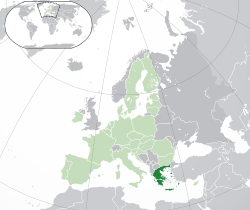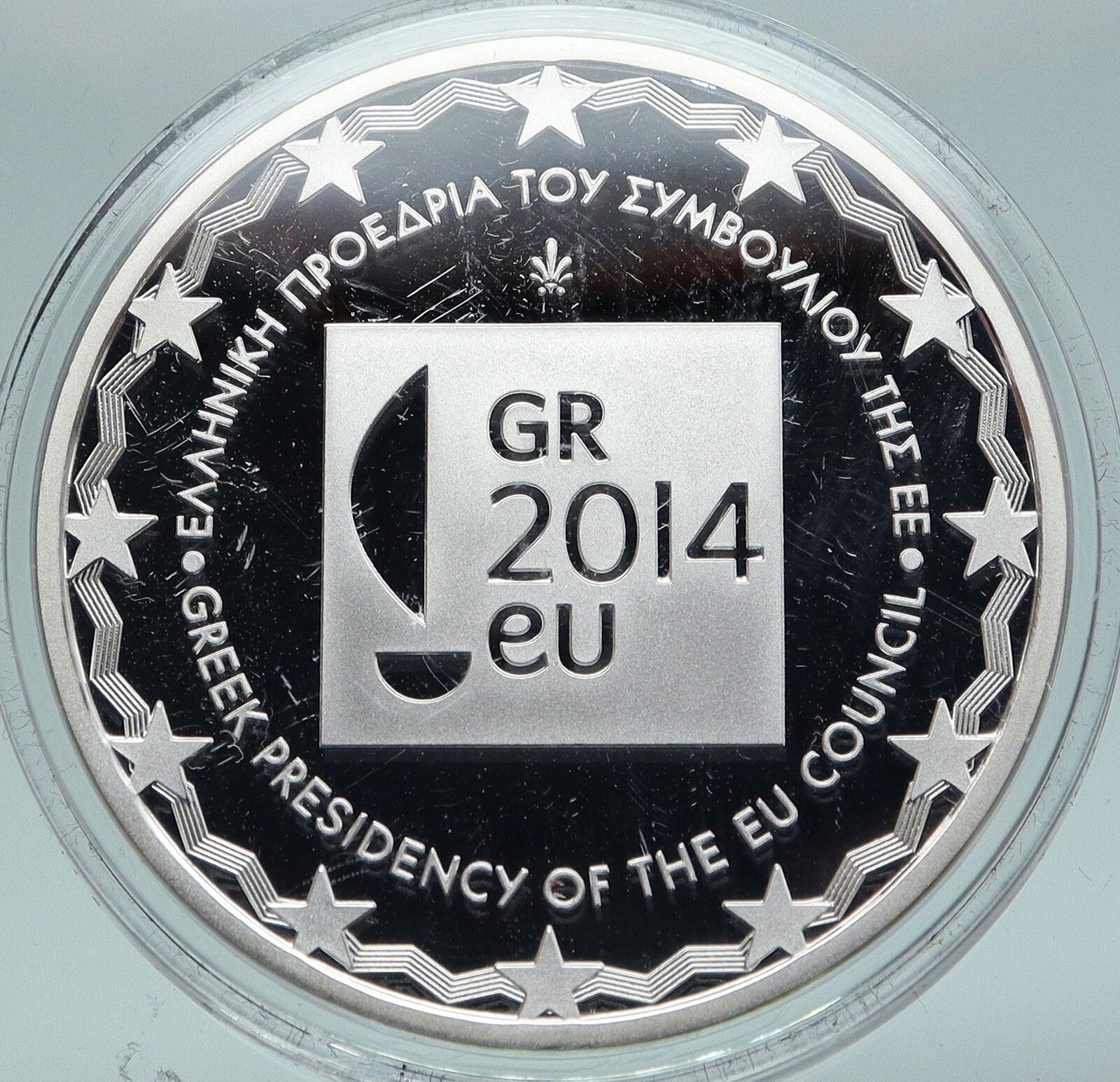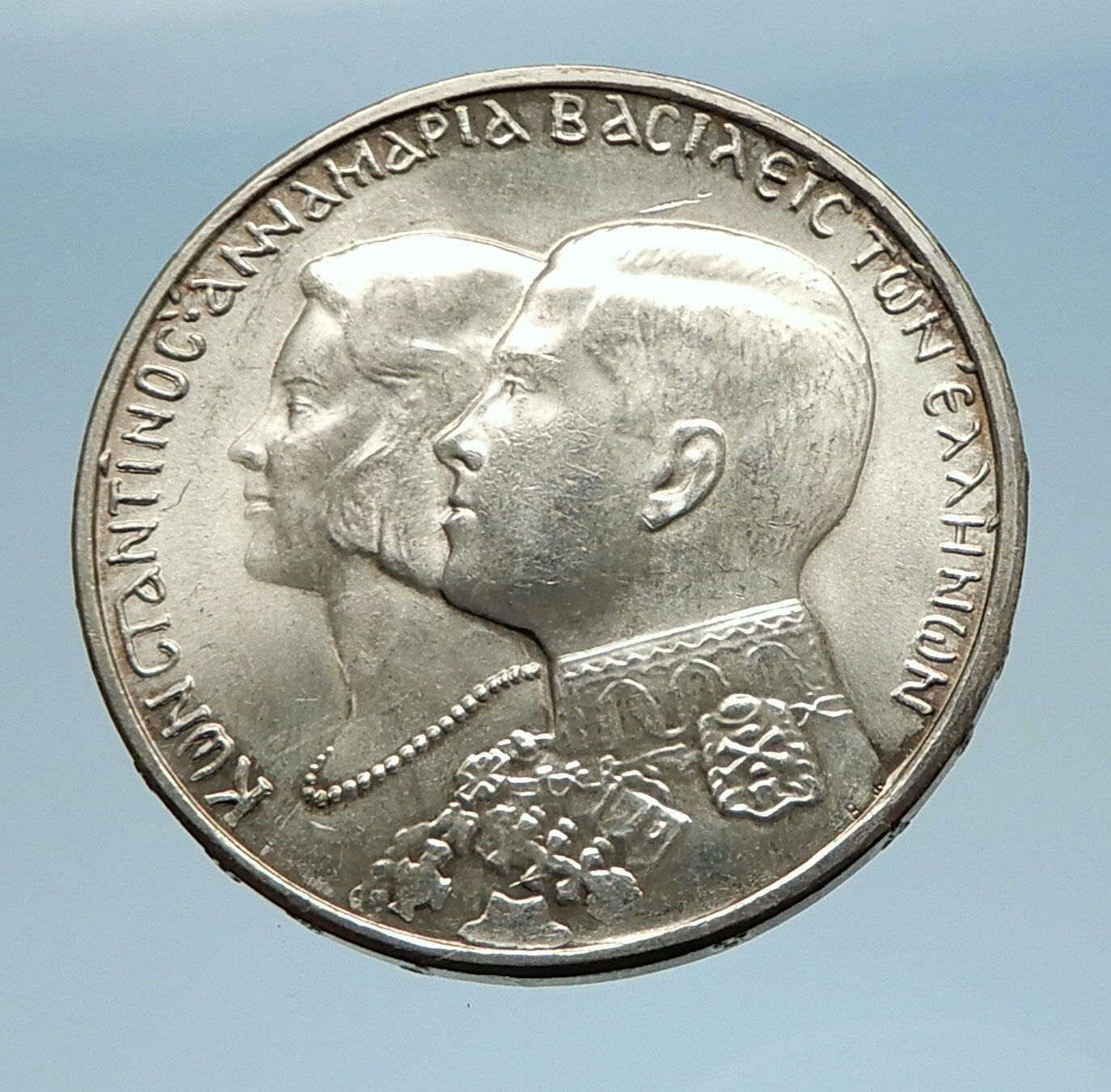|
Greece – Paul I – King: 1 April 1947 – 6 March 1964
1960 Silver 20 Drachmai 26mm (7.49 grams) 0.835 Silver (0.2013 oz. ASW)
Reference: KM# 85
ΠΑΥΛΟΣ ΒΑΣΙΛΕΥΣ ΤΩΝ ΕΛΛΗΝΩΝ • Year •, Head of King Paul I left.
Selene the moon goddess on horseback; 20 ΔΡΧ to left.
Edge Lettering: ΒΑΣΙΛΕΙΟΝ ΤΗΣ ΕΛΛΑΔΟΣ ★★ Year ★★
You are bidding on the exact item pictured, provided with a Certificate of Authenticity and Lifetime Guarantee of Authenticity.
 In Greek mythology, Selene is the goddess of the moon. She is the daughter of the Titans Hyperion and Theia, and sister of the sun-god Helios, and Eos, goddess of the dawn. She drives her moon chariot across the heavens. Several lovers are attributed to her in various myths, including Zeus, Pan, and the mortal Endymion. In classical times, Selene was often identified with Artemis, much as her brother, Helios, was identified with Apollo. Both Selene and Artemis were also associated with Hecate, and all three were regarded as lunar goddesses, although only Selene was regarded as the personification of the moon itself. Her Roman equivalent is Luna. In Greek mythology, Selene is the goddess of the moon. She is the daughter of the Titans Hyperion and Theia, and sister of the sun-god Helios, and Eos, goddess of the dawn. She drives her moon chariot across the heavens. Several lovers are attributed to her in various myths, including Zeus, Pan, and the mortal Endymion. In classical times, Selene was often identified with Artemis, much as her brother, Helios, was identified with Apollo. Both Selene and Artemis were also associated with Hecate, and all three were regarded as lunar goddesses, although only Selene was regarded as the personification of the moon itself. Her Roman equivalent is Luna.
Paul (Greek: Παύλος, Pávlos; 14 December 1901 – 6 March 1964) was King of Greece from 1947 until his death in 1964.
Paul was born at Tatoi Palace in Athens, the third son of King Constantine I of Greece and his wife, Princess Sophia of Prussia. He trained as an army officer at the Royal Military College, Sandhurst and later at the Hellenic Military Academy in Kypseli, Athens. Paul was an army officer cadet in the Coldstream Guards and Lieutenant with the Evzones.
 From 1917 to 1920, Paul lived in exile with his father, Constantine I. From 1923 to 1935, he lived in exile again in England, this time with his brother, George II. He worked briefly in an aircraft factory under an alias, and through Viscount Tredegar met and befriended notorious literary muse Denham Fouts, who later alleged an affair. However, Fouts’s friend John B. L. Goodwin said Fouts often made up stories about his life, and literary critic Katherine Bucknell thought many of the tales about him were myth. From 1917 to 1920, Paul lived in exile with his father, Constantine I. From 1923 to 1935, he lived in exile again in England, this time with his brother, George II. He worked briefly in an aircraft factory under an alias, and through Viscount Tredegar met and befriended notorious literary muse Denham Fouts, who later alleged an affair. However, Fouts’s friend John B. L. Goodwin said Fouts often made up stories about his life, and literary critic Katherine Bucknell thought many of the tales about him were myth.
Reign
Paul returned to Greece in 1946. He succeeded to the throne in 1947, on the death of his childless elder brother, King George II, during the Greek Civil War (between Greek Communists and the non-communist Greek government). In 1947 he was unable to attend the wedding of his first cousin, Prince Philip, Duke of Edinburgh to the future Queen Elizabeth II of the United Kingdom as he was suffering from typhoid fever.
By 1949 the Civil War was effectively over, with the Communist insurgents ceasing the majority of their operations, and the task of rebuilding the shattered north of the country began.
In the 1950s Greece recovered economically, and diplomatic and trade links were strengthened by Paul’s state visits abroad. He became the first Greek Monarch to visit a Turkish Head of State. However, links with Britain became strained over Cyprus, where the majority Greek population favored union with Greece, which Britain, as the colonial power, would not endorse. Eventually, Cyprus became an independent state in 1960.
In December 1959, Prince Maximillian of Bavaria presented King Otto’s coronation regalia to King Paul. It had been almost a century since they were last in Greece.
Meanwhile, republican sentiment was growing in Greece. Both Paul and Frederica attracted criticism for their interference in politics, frequent foreign travels, and the cost of maintaining the Royal Family. Paul responded by economising and donated his private estate at Polidendri to the State.
In 1959, he had an operation for a cataract, and in 1963 an emergency operation for appendicitis. In late February 1964, he underwent a further operation for stomach cancer, and died about a week later in Athens. He was succeeded by his son, Constantine II.
Legacy
In March 2014, a memorial service took place at Tatoi Palace in Athens commemorating the fiftieth anniversary of Paul’s death. Members of the Greek and Spanish royal families were present.
 Greece (Greek: Ελλάδα), officially the Hellenic Republic (Greek: Ελληνική Δημοκρατία), historically also known as Hellas, is a country in Southern Europe, with a population of approximately 11 million as of 2016. Athens is the nation’s capital and largest city, followed by Thessaloniki. Greece (Greek: Ελλάδα), officially the Hellenic Republic (Greek: Ελληνική Δημοκρατία), historically also known as Hellas, is a country in Southern Europe, with a population of approximately 11 million as of 2016. Athens is the nation’s capital and largest city, followed by Thessaloniki.
Greece is located at the crossroads of Europe, Asia, and Africa. Situated on the southern tip of the Balkan peninsula, it shares land borders with Albania to the northwest, the Republic of Macedonia and Bulgaria to the north, and Turkey to the northeast. The Aegean Sea lies to the east of the mainland, the Ionian Sea to the west, the Cretan Sea and the Mediterranean Sea to the south. Greece has the longest coastline on the Mediterranean Basin and the 11th longest coastline in the world at 13,676 km (8,498 mi) in length, featuring a large number of islands, of which 227 are inhabited. Eighty percent of Greece is mountainous, with Mount Olympus being the highest peak at 2,918 metres (9,573 ft). The country consists of nine geographic regions: Macedonia, Central Greece, the Peloponnese, Thessaly, Epirus, the Aegean Islands (including the Dodecanese and Cyclades), Thrace, Crete, and the Ionian Islands.
 Greece is considered the cradle of Western civilization,[a] being the birthplace of democracy, Western philosophy, the Olympic Games, Western literature, historiography, political science, major scientific and mathematical principles, and Western drama.[12] From the eighth century BC, the Greeks were organised into various independent city-states, known as polis, which spanned the entire Mediterranean region and the Black Sea. Philip of Macedon united most of the Greek mainland in the fourth century BC, with his son Alexander the Great rapidly conquering much of the ancient world, spreading Greek culture and science from the eastern Mediterranean to the Indus River. Greece was annexed by Rome in the second century BC, becoming an integral part of the Roman Empire and its successor, the Byzantine Empire, wherein the Greek language and culture were dominant. The Greek Orthodox Church also shaped modern Greek identity and transmitted Greek traditions to the wider Orthodox World. Falling under Ottoman dominion in the mid-15th century, the modern nation state of Greece emerged in 1830 following a war of independence. Greece’s rich historical legacy is reflected by its 18 UNESCO World Heritage Sites, among the most in Europe and the world. Greece is considered the cradle of Western civilization,[a] being the birthplace of democracy, Western philosophy, the Olympic Games, Western literature, historiography, political science, major scientific and mathematical principles, and Western drama.[12] From the eighth century BC, the Greeks were organised into various independent city-states, known as polis, which spanned the entire Mediterranean region and the Black Sea. Philip of Macedon united most of the Greek mainland in the fourth century BC, with his son Alexander the Great rapidly conquering much of the ancient world, spreading Greek culture and science from the eastern Mediterranean to the Indus River. Greece was annexed by Rome in the second century BC, becoming an integral part of the Roman Empire and its successor, the Byzantine Empire, wherein the Greek language and culture were dominant. The Greek Orthodox Church also shaped modern Greek identity and transmitted Greek traditions to the wider Orthodox World. Falling under Ottoman dominion in the mid-15th century, the modern nation state of Greece emerged in 1830 following a war of independence. Greece’s rich historical legacy is reflected by its 18 UNESCO World Heritage Sites, among the most in Europe and the world.
Greece is a democratic and developed country with an advanced high-income economy, a high quality of life, and a very high standard of living. A founding member of the United Nations, Greece was the tenth member to join the European Communities (precursor to the European Union) and has been part of the Eurozone since 2001. It is also a member of numerous other international institutions, including the Council of Europe, the North Atlantic Treaty Organization (NATO), the Organisation for Economic Co-operation and Development (OECD), the World Trade Organization (WTO), the Organization for Security and Co-operation in Europe (OSCE), and the Organisation internationale de la Francophonie (OIF). Greece’s unique cultural heritage, large tourism industry, prominent shipping sector and geostrategic importance[b] classify it as a middle power. It is the largest economy in the Balkans, where it is an important regional investor.
|





 In Greek mythology, Selene is the goddess of the moon. She is the daughter of the Titans Hyperion and Theia, and sister of the sun-god Helios, and Eos, goddess of the dawn. She drives her moon chariot across the heavens. Several lovers are attributed to her in various myths, including Zeus, Pan, and the mortal Endymion. In classical times, Selene was often identified with Artemis, much as her brother, Helios, was identified with Apollo. Both Selene and Artemis were also associated with Hecate, and all three were regarded as lunar goddesses, although only Selene was regarded as the personification of the moon itself. Her Roman equivalent is Luna.
In Greek mythology, Selene is the goddess of the moon. She is the daughter of the Titans Hyperion and Theia, and sister of the sun-god Helios, and Eos, goddess of the dawn. She drives her moon chariot across the heavens. Several lovers are attributed to her in various myths, including Zeus, Pan, and the mortal Endymion. In classical times, Selene was often identified with Artemis, much as her brother, Helios, was identified with Apollo. Both Selene and Artemis were also associated with Hecate, and all three were regarded as lunar goddesses, although only Selene was regarded as the personification of the moon itself. Her Roman equivalent is Luna. From 1917 to 1920, Paul lived in exile with his father, Constantine I. From 1923 to 1935, he lived in exile again in England, this time with his brother, George II. He worked briefly in an aircraft factory under an alias, and through Viscount Tredegar met and befriended notorious literary muse Denham Fouts, who later alleged an affair. However, Fouts’s friend John B. L. Goodwin said Fouts often made up stories about his life, and literary critic Katherine Bucknell thought many of the tales about him were myth.
From 1917 to 1920, Paul lived in exile with his father, Constantine I. From 1923 to 1935, he lived in exile again in England, this time with his brother, George II. He worked briefly in an aircraft factory under an alias, and through Viscount Tredegar met and befriended notorious literary muse Denham Fouts, who later alleged an affair. However, Fouts’s friend John B. L. Goodwin said Fouts often made up stories about his life, and literary critic Katherine Bucknell thought many of the tales about him were myth. Greece (Greek: Ελλάδα), officially the Hellenic Republic (Greek: Ελληνική Δημοκρατία), historically also known as Hellas, is a country in Southern Europe, with a population of approximately 11 million as of 2016. Athens is the nation’s capital and largest city, followed by Thessaloniki.
Greece (Greek: Ελλάδα), officially the Hellenic Republic (Greek: Ελληνική Δημοκρατία), historically also known as Hellas, is a country in Southern Europe, with a population of approximately 11 million as of 2016. Athens is the nation’s capital and largest city, followed by Thessaloniki. Greece is considered the cradle of Western civilization,[a] being the birthplace of democracy, Western philosophy, the Olympic Games, Western literature, historiography, political science, major scientific and mathematical principles, and Western drama.[12] From the eighth century BC, the Greeks were organised into various independent city-states, known as polis, which spanned the entire Mediterranean region and the Black Sea. Philip of Macedon united most of the Greek mainland in the fourth century BC, with his son Alexander the Great rapidly conquering much of the ancient world, spreading Greek culture and science from the eastern Mediterranean to the Indus River. Greece was annexed by Rome in the second century BC, becoming an integral part of the Roman Empire and its successor, the Byzantine Empire, wherein the Greek language and culture were dominant. The Greek Orthodox Church also shaped modern Greek identity and transmitted Greek traditions to the wider Orthodox World. Falling under Ottoman dominion in the mid-15th century, the modern nation state of Greece emerged in 1830 following a war of independence. Greece’s rich historical legacy is reflected by its 18 UNESCO World Heritage Sites, among the most in Europe and the world.
Greece is considered the cradle of Western civilization,[a] being the birthplace of democracy, Western philosophy, the Olympic Games, Western literature, historiography, political science, major scientific and mathematical principles, and Western drama.[12] From the eighth century BC, the Greeks were organised into various independent city-states, known as polis, which spanned the entire Mediterranean region and the Black Sea. Philip of Macedon united most of the Greek mainland in the fourth century BC, with his son Alexander the Great rapidly conquering much of the ancient world, spreading Greek culture and science from the eastern Mediterranean to the Indus River. Greece was annexed by Rome in the second century BC, becoming an integral part of the Roman Empire and its successor, the Byzantine Empire, wherein the Greek language and culture were dominant. The Greek Orthodox Church also shaped modern Greek identity and transmitted Greek traditions to the wider Orthodox World. Falling under Ottoman dominion in the mid-15th century, the modern nation state of Greece emerged in 1830 following a war of independence. Greece’s rich historical legacy is reflected by its 18 UNESCO World Heritage Sites, among the most in Europe and the world.




